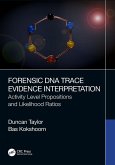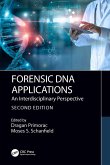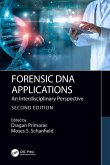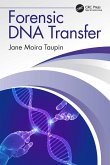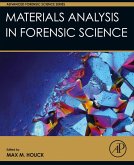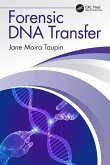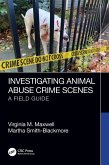Duncan Taylor, Bas Kokshoorn
Forensic DNA Trace Evidence Interpretation (eBook, ePUB)
Activity Level Propositions and Likelihood Ratios
81,95 €
81,95 €
inkl. MwSt.
Sofort per Download lieferbar

41 °P sammeln
81,95 €
Als Download kaufen

81,95 €
inkl. MwSt.
Sofort per Download lieferbar

41 °P sammeln
Jetzt verschenken
Alle Infos zum eBook verschenken
81,95 €
inkl. MwSt.
Sofort per Download lieferbar
Alle Infos zum eBook verschenken

41 °P sammeln
Duncan Taylor, Bas Kokshoorn
Forensic DNA Trace Evidence Interpretation (eBook, ePUB)
Activity Level Propositions and Likelihood Ratios
- Format: ePub
- Merkliste
- Auf die Merkliste
- Bewerten Bewerten
- Teilen
- Produkt teilen
- Produkterinnerung
- Produkterinnerung

Bitte loggen Sie sich zunächst in Ihr Kundenkonto ein oder registrieren Sie sich bei
bücher.de, um das eBook-Abo tolino select nutzen zu können.
Hier können Sie sich einloggen
Hier können Sie sich einloggen
Sie sind bereits eingeloggt. Klicken Sie auf 2. tolino select Abo, um fortzufahren.

Bitte loggen Sie sich zunächst in Ihr Kundenkonto ein oder registrieren Sie sich bei bücher.de, um das eBook-Abo tolino select nutzen zu können.
Provides all concepts and foundational information required to understand the practice of evaluating forensic biology evidence given activity level propositions and to implement the practice into active casework within a forensic institution.
- Geräte: eReader
- mit Kopierschutz
- eBook Hilfe
Andere Kunden interessierten sich auch für
![Forensic DNA Trace Evidence Interpretation (eBook, PDF) Forensic DNA Trace Evidence Interpretation (eBook, PDF)]() Duncan TaylorForensic DNA Trace Evidence Interpretation (eBook, PDF)81,95 €
Duncan TaylorForensic DNA Trace Evidence Interpretation (eBook, PDF)81,95 €![Forensic DNA Applications (eBook, ePUB) Forensic DNA Applications (eBook, ePUB)]() Forensic DNA Applications (eBook, ePUB)65,95 €
Forensic DNA Applications (eBook, ePUB)65,95 €![Forensic DNA Applications (eBook, PDF) Forensic DNA Applications (eBook, PDF)]() Forensic DNA Applications (eBook, PDF)65,95 €
Forensic DNA Applications (eBook, PDF)65,95 €![Forensic DNA Transfer (eBook, ePUB) Forensic DNA Transfer (eBook, ePUB)]() Jane Moira TaupinForensic DNA Transfer (eBook, ePUB)54,95 €
Jane Moira TaupinForensic DNA Transfer (eBook, ePUB)54,95 €![Materials Analysis in Forensic Science (eBook, ePUB) Materials Analysis in Forensic Science (eBook, ePUB)]() Materials Analysis in Forensic Science (eBook, ePUB)53,95 €
Materials Analysis in Forensic Science (eBook, ePUB)53,95 €![Forensic DNA Transfer (eBook, PDF) Forensic DNA Transfer (eBook, PDF)]() Jane Moira TaupinForensic DNA Transfer (eBook, PDF)54,95 €
Jane Moira TaupinForensic DNA Transfer (eBook, PDF)54,95 €![Investigating Animal Abuse Crime Scenes (eBook, ePUB) Investigating Animal Abuse Crime Scenes (eBook, ePUB)]() Virginia M. MaxwellInvestigating Animal Abuse Crime Scenes (eBook, ePUB)57,95 €
Virginia M. MaxwellInvestigating Animal Abuse Crime Scenes (eBook, ePUB)57,95 €-
-
-
Provides all concepts and foundational information required to understand the practice of evaluating forensic biology evidence given activity level propositions and to implement the practice into active casework within a forensic institution.
Dieser Download kann aus rechtlichen Gründen nur mit Rechnungsadresse in A, B, BG, CY, CZ, D, DK, EW, E, FIN, F, GR, HR, H, IRL, I, LT, L, LR, M, NL, PL, P, R, S, SLO, SK ausgeliefert werden.
Produktdetails
- Produktdetails
- Verlag: Taylor & Francis eBooks
- Seitenzahl: 582
- Erscheinungstermin: 30. Mai 2023
- Englisch
- ISBN-13: 9781000801415
- Artikelnr.: 67770511
- Verlag: Taylor & Francis eBooks
- Seitenzahl: 582
- Erscheinungstermin: 30. Mai 2023
- Englisch
- ISBN-13: 9781000801415
- Artikelnr.: 67770511
- Herstellerkennzeichnung Die Herstellerinformationen sind derzeit nicht verfügbar.
Duncan Taylor is the Chief Scientist of Forensic Statistics at Forensic Science South Australia (FSSA), Adelaide, Australia. He has studied and worked in the forensic field for over 20 years, supervising criminal casework in hundreds of cases for both prosecution and defence, and testifying in Courts around Australia. He holds PhDs in molecular biology and statistics, both obtained from Flinders University. Dr Taylor is one of the developers of STRmix(TM), a probabilistic DNA interpretation software being used in forensic DNA laboratories around the world and a developer of the neural network component of FaSTR(TM), a DNA profile reading software. He is an Associate Professor of biology and Distinguished Alumni at Flinders University, supervising honours, masters and PhD students in biology and statistics projects. Duncan collaborates with colleagues around the world and has over 120 peer-reviewed publications, and a book on DNA evidence interpretation. In 2017 Duncan was awarded the SA Science Excellence STEM professional award and in 2018 was part of the group that won the New Zealand Prime Minister's Science Award. In 2021 Duncan was awarded the Public Service Medal for contributions to forensic statistics.
Bas Kokshoorn is a principal scientist at the Netherlands Forensic Institute (NFI) in The Hague (The International City of Peace and Justice). Bas started his career at the NFI in 2008 and since then has submitted over 1,000 reports on forensic biology examinations and interpretations to the Dutch criminal justice system, as well as to international tribunals, and other jurisdictions in continental Europe, the UK, and Australia. Bas holds a PhD in evolutionary biology from Leiden University and is currently appointed professor in 'Forensic Trace Dynamics' at the Amsterdam University of Applied Sciences (AUAS). In this role he supervises bachelor, masters and PhD students working on research projects aimed at understanding the dynamics of transfer, persistence, prevalence, and recovery of biological and other types of trace evidence and the interpretation of such findings in criminal cases.
Bas Kokshoorn is a principal scientist at the Netherlands Forensic Institute (NFI) in The Hague (The International City of Peace and Justice). Bas started his career at the NFI in 2008 and since then has submitted over 1,000 reports on forensic biology examinations and interpretations to the Dutch criminal justice system, as well as to international tribunals, and other jurisdictions in continental Europe, the UK, and Australia. Bas holds a PhD in evolutionary biology from Leiden University and is currently appointed professor in 'Forensic Trace Dynamics' at the Amsterdam University of Applied Sciences (AUAS). In this role he supervises bachelor, masters and PhD students working on research projects aimed at understanding the dynamics of transfer, persistence, prevalence, and recovery of biological and other types of trace evidence and the interpretation of such findings in criminal cases.
1. Principles of Evaluation 2. Evaluation of Observations Given Activity
Level Propositions 3. Transfer, Persistence, Prevalence, and Recovery of
Biological Traces 4. Structuring Case Information 5. Basic Mechanisms of
Evaluation 6. Fundamentals of Bayesian Networks 7. Advanced Mechanisms of
Evaluation 8. Testing Robustness of Evaluation 9. Cell Type Testing 10.
Reporting 11. Implementation 12. Beyond Forensic Biology 13. Looking to the
Future 14. Answers to Practice Questions
Level Propositions 3. Transfer, Persistence, Prevalence, and Recovery of
Biological Traces 4. Structuring Case Information 5. Basic Mechanisms of
Evaluation 6. Fundamentals of Bayesian Networks 7. Advanced Mechanisms of
Evaluation 8. Testing Robustness of Evaluation 9. Cell Type Testing 10.
Reporting 11. Implementation 12. Beyond Forensic Biology 13. Looking to the
Future 14. Answers to Practice Questions
1. Principles of Evaluation 2. Evaluation of Observations Given Activity
Level Propositions 3. Transfer, Persistence, Prevalence, and Recovery of
Biological Traces 4. Structuring Case Information 5. Basic Mechanisms of
Evaluation 6. Fundamentals of Bayesian Networks 7. Advanced Mechanisms of
Evaluation 8. Testing Robustness of Evaluation 9. Cell Type Testing 10.
Reporting 11. Implementation 12. Beyond Forensic Biology 13. Looking to the
Future 14. Answers to Practice Questions
Level Propositions 3. Transfer, Persistence, Prevalence, and Recovery of
Biological Traces 4. Structuring Case Information 5. Basic Mechanisms of
Evaluation 6. Fundamentals of Bayesian Networks 7. Advanced Mechanisms of
Evaluation 8. Testing Robustness of Evaluation 9. Cell Type Testing 10.
Reporting 11. Implementation 12. Beyond Forensic Biology 13. Looking to the
Future 14. Answers to Practice Questions

